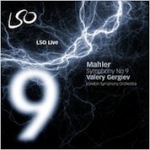Gergiev brings this symphony home in just under 80 minutes, and so it fits on a single disc. I have no doubt that anyone attending this concert would have come away satisfied: it’s a solid, serious performance, but it’s not particularly well played, or distinctively interpreted. The first movement works best. It’s well paced, with effective climaxes, but already it’s evident that the balances and the acoustic project the strings in a most unflattering light. They sound weak, thin, and tentative. Even the finale, which begins quite beautifully, fails to accumulate the necessary density of sonority as the music surges forward.
In the central movements the first scherzo lacks personality. Gergiev’s treatment of the opening dance is disarmingly matter-of-fact, the waltz swift but never sharply accented enough to capture the music’s bitter edge. The Rondo: Burleske has moments of shaky ensemble, particularly in the reprise, which starts off so quickly that you wonder how Gergiev will find room to accelerate toward the end. Answer: he doesn’t. Again, this isn’t a dishonorable performance, but it’s just not competitive with the best either interpretively or sonically.
































